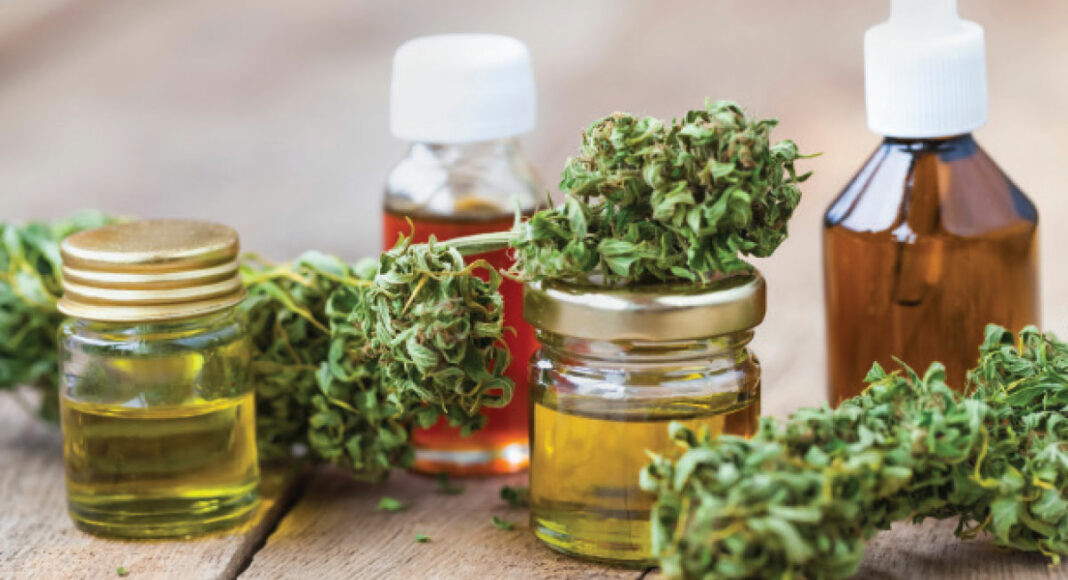In the ever-widening world of weed chemistry, one active ingredient has emerged as the breakout wellness star of California’s legal cannabis market—and it’s not the one that gets you high.
First discovered in the 1940s and demonized during the post-Reefer Madness era, CBD—a cannabinoid like its better-known psychoactive cousin, THC—has reemerged in the world of legal cannabis as a pain-and-anxiety-relieving alternative to more psychoactive cannabis products, as well as to synthetic painkillers like opioids.
“Everyone’s initial thought with the adult use was we would see a large increase in recreational use,” says Jessica Kim, a product specialist at KindPeoples Collective. “It’s increased a lot on the medical side, even though these folks don’t have medical recommendations.”
Across the board, Kim says much of the demand for CBD products at KindPeoples stems from either newcomers or older customers returning after a long break from cannabis.
“They’ll come in and say, ‘I don’t want to get high, but this is what’s wrong with me.’”
From anxiety to arthritis to Crohn’s disease to neurological conditions like Parkinson’s disease, would-be patients are now inundating a growing number of CBD purveyors, from organic grocery stores selling less-concentrated hemp derivatives to cannabis dispensaries like KindPeoples that offer a wide array of CBD blends.
CBD’s medical potential has been an area of interest for researchers since around 1980, when isolated studies started to show positive effects of CBD treatment for conditions including epilepsy. Since then, larger-scale studies were severely constrained by prohibition, and research in the U.S. is just now beginning to systematically evaluate CBD’s efficacy to treat specific symptoms.
Key to the perceived wellness benefits of CBD is the way the chemical interacts with cell receptors in the endocannabinoid system, which helps regulate the body’s neurological system, stress levels, sleep cycle, memory and other functions. “CBD kind of selectively fits into the receptors in your brain that THC would normally go into,” Kim says. “It just doesn’t impart that psychological high people are used to.”
With the range of CBD oils, vaporizers and topical creams on the legal market growing by the day, such products are a prime example of the way consumers frustrated with high-cost, pharmaceutical-centric healthcare are seeking new regimens of personalized medicine.
This year, Santa Cruz massage and bodywork studio Vital Body Therapy became the first in town to offer CBD massage. “Over 65 percent [of our clients] say that they come to us to manage their chronic pain. So, when over 80 people chose the CBD massage the first month we offered it, we were further convinced that people are committed to finding alternative ways to manage their pain instead of using opioids,” says Kelly Stoll in an email.
Owners Stoll and Jennifer Galvin also now offer a growing range of custom-formulated CBD massage creams, balms and an epsom soak sold by recently-launched sister company Vital Body Therapeutics.
If the world of CBD seems vast, that’s because it is. Key to the appeal of CBD topical creams, oils and vaporizers is that products offer different ratios of CBD to THC—or CBD-only products available over the counter—which Kim says can be tailored to different symptoms.
For neurological conditions like Parkinson’s—a more recent area of focus for CBD wellness advocates—Kim recommends products with high ratios of CBD, starting around 20 parts CBD to 1 part THC. The ratio of THC is often higher for epilepsy patients and those looking to treat autoimmune diseases like Chron’s Disease and IBS. For acute pain, like arthritis, Kim recommends more balanced ratios of 2-to-1 or 1-to-1 to take full advantage of THC’s strong analgesic effects.
Even if there’s no shortage of demand for CBD, the economics of such products are still evolving. Hemp-based products, for instance, don’t carry the 15-percent state-mandated excise tax for cannabis products, and Kim says dispensaries are often able to discount larger quantities. Still, the products don’t come cheap—weighing in around $60 for a 1,000 mg tincture combining CBD and essential oils at KindPeoples.
Vital Body Therapy strives to offer reduced-price body work on a case-by-case basis to clients who cannot afford it—many of whom are also members of Wo/Men’s Alliance for Medical Marijuana (WAMM).
“It’s truly a choice people are making based upon their own history of addiction or powerful stories of family members and friends who have died from opioid overdosing that started with a simple prescription to help manage their pain,” says Stoll.














This is a great article. SO, do you only need a Ca Board o Equalization Seller’s Permit to sell CBD Products?